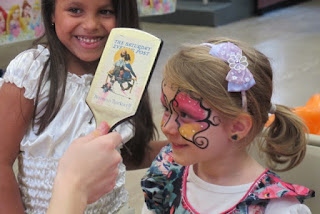Help your child to triumph over the shyness!
Build his/her self-confidence. Find out if there are certain areas where your child feels insecure that are leading to the shyness, and work on helping to improve those. Provide your child with lots of areas to excel, opportunities to prove himself, and activities to build self confidence. Also remember that all different things give kids a feeling of confidence, e.g. new outfit or a great hairstyle can give a kid that extra something he/she needs to feel braver.
Create
places that will be his/her "territory." It's always easier
to feel self confident when we feel like we're someplace we belong. Try to
give your kid at least a handful of places like this. If possible, try to
set up new meetings in places where your child feels at home.
Provide
your child with ready answers, phrases to use in different situations. It will
help the kid to know the right things to say in new situations or with
new people. Talk about what sorts of things he/she can say to kids he/she would
like to approach just to get a conversation started, for instance introducing yourself,
e.g. "Hi, I'm ______. What's your name?" or giving a complement,
e.g. "I like your face painting." Brainstorm together about lines can be said to break the ice with potential friends and with groups of people. Remind
your kid that body language, like a smile, eye contact, closer distance can show
other kids that you want to be friends.
Practice
playing roles. Set up situations and talk through them with your child,
just to get ideas on how he/she can act and what to say. Make it jolly to
keep it optimistic, and take turns playing different characters.
Teach getting ready for a conversation by following
simple steps: calm yourself down
by taking few deeper breaths, count silently to 5, make an eye contact and go:
"Hi, I'm Basia. What's your name?" "My name is Rapunzel."
"May I try how does the cotton feel?" “Certainly, you may.”
"May I pet the dog?" "Yes. Go ahead."
"May I hold the bird?" "Yes. Give me your hand."
Acting Exercises might be also very helpful. See some suggestions
below:















No comments:
Post a Comment